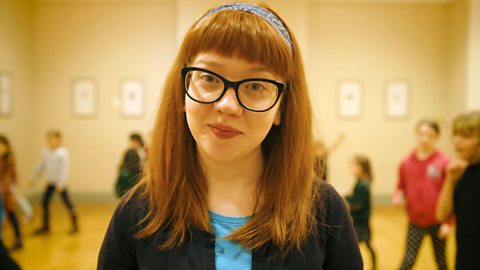Meet Thomas, 21, from Gateshead. He designs characters and worlds for games and films. Part of our Bitesize world of work series.
Thomas:
Hi, I'm Thomas. I'm 21 years old and I'm a concept artist. Concept artists design the world that films and games are set in, design the characters, their clothes, environments, the homes they live in, the props that they use. Everything has to be designed before the film or the game can be made.
When I come to work in the morning, I'm set with the brief. I would sketch things out to begin with. That gets sent to the client and then they pick what they like, pick what they don't like and then come with the next stage of design and oftentimes on a project, we're working as a team of maybe five or six. We're all doing different parts, so we have to keep communicating with each other. My graphics tablet allows me to simulate real pencil and paper, but on the computer. It's much faster – we can undo if we make mistakes and it allows me to switch between tools, so I can use what looks like a paintbrush, and then use what looks like a pencil. The second screen that I have, it's almost entirely for me to bring up reference. If I'm designing a character from the Stone Age or something, I need to know what sort of materials their clothing would be made out of.
What I really love about working here is all the extra activities we get to do. During lunch we're playing games cos we've got to keep on top of what's cool, what's trendy and then we do things like life drawing with our friends to get better at what we do.
When it comes to concept art, illustrative skill is important – everyone needs to be able to draw. But beyond that it's communication and understanding the client's needs.
As a child, I was always very creative. And I really enjoyed Art at GCSE. But I found that it almost felt restrictive on what I was allowed to do and so when it came to A-level, I actually dropped Art and chose Biology, Chemistry, Physics and Maths. Creating concept art, you've really got to make things you're creating functional. When designing a vehicle, I've got to know where the engine might go. Understanding how light interacts with objects and I think the science really helped me think about in a very logical way. Leading on from that, I did an art foundation course at the nearby college. I specialised in illustration and that's where I started to learn how to use a graphics tablet.
It wasn't an easy path, getting into the job I have today. It's very competitive and you really have to have a portfolio that stands out from the rest. I contacted a lot of people that are working in the industry. I asked them for their opinions and I contacted art directors and a lot of them said things like put sketches in your portfolio, they want to be able to see that you can design things quickly. They want to see full projects, where you're not just doing a single character, but multiple characters and maybe the home they live in, the world that they inhabit. And so, with all this sort of advice, I worked hard and I managed to make a portfolio that was good enough for me to get the job I have today. I'm really fortunate to have turned my hobby into my career and I'm excited to come to work and see what projects I'm going to work on next.
I'm really fortunate to have turned my hobby into my career and I'm excited to come to work and see what projects I'm going to work on next.
Thomas did an Art foundation course at college, specialising in illustration, where he learned how to use a graphics tablet
He now works as a concept artist, designing the worlds that films and games are set in, designing the characters, their clothes, environments, the homes they live in and props that they use
When it comes to concept art, illustrative skill is important. Everyone needs to be able to draw. But it's also important to have good communication skills to help understand the client's needs
It wasn't an easy path for Thomas to get into his job as a concept artist. It's a very competitive field and you have to have a portfolio that stands out.

What to expect if you want to be a concept artist
Thomas is a concept artist. You can get into this role through a number of different courses, such as Art and Design or Illustration. There are also specialist Concept Art courses, focusing on areas such as concept art for comics, computer games, and films. Thomas built his career as a games and films concept artist through a degree in Illustration.
For careers advice in all parts of the UK visit: National Careers Service (England), nidirect (Northern Ireland), My World of Work (Scotland) and Careers Wales (Wales).

Work experience in your area
Find work experience placements with Workfinder.
Tips and advice
Help with interviews, writing a CV and all things work experience related.

Anh: illustrator. video
Anh illustrates books and computer games.

How I turned my hobby into a career
Find out more about Megan's journey.

Rhianne: games designer. video
Rhianne designs and tests video games.
